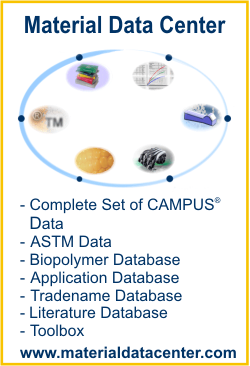Material Data Center is a leading international information system for the plastics industry. Material Data Center offers a comprehensive plastics database, calculation tools, CAE interfaces, a literature database and an application database. For more information about Material Data Center visit www.materialdatacenter.com.
This is the free Material Data Center Datasheet of Kepstan® 7002 - PAEK - ARKEMA
unit conversion, PDF datasheet print, comparison with other plastics, snap fit calculation, beam deflection calculation, CAE Interfaces
Check here, which other Kepstan datasheets, application examples or technical articles are available in Material Data Center
KEPSTAN® PEKK resin is a high performance thermoplastic material, based on PolyEtherKetoneKetone (PEKK) highly stable chemical backbone. Its semi crystalline structure in solid state offers an outstanding combination of mechanical and thermal strength together with chemical and fire resistance.
Among the KEPSTAN® family, the 7000 Series benefits uniquely from PEKK crystalline capabilities while reducing significantly processing temperatures compared to the more crystalline 8000 Series. With a reduced melting temperature (® decreased by 25°C) and a Tg above 160°C, the KEPSTAN® 7000 Series resins are highly enabling in the field of continuous fiber composites for structural applications.
KEPSTAN® 7000 Series includes a medium flow grade, KEPSTAN® 7002, and a high flow grade, KEPSTAN® 7003, both unfilled PEKK resins designed to meet the requirements of a broad range of melt processing technologies, including among others extrusion, injection molding, fiber impregnation, consolidation and composite forming technologies.
KEPSTAN® PEKK resin is available in pellet form and in powder form with different particle sizes.
Standard packaging includes 20 kg boxes for pellets and 10 kg boxes for powders.
| Processing/Physical Characteristics | Value | Unit | Test Standard | ||||||||||||||||||||||||||||||||||||||||||||||||||||||||||||||||||||||||||||||||||||||||||||||||
| ISO Data | |||||||||||||||||||||||||||||||||||||||||||||||||||||||||||||||||||||||||||||||||||||||||||||||||||
| Melt volume-flow rate, MVR | 35 | cm³/10min | ISO 1133 | ||||||||||||||||||||||||||||||||||||||||||||||||||||||||||||||||||||||||||||||||||||||||||||||||
| Temperature | 380 | °C | - | ||||||||||||||||||||||||||||||||||||||||||||||||||||||||||||||||||||||||||||||||||||||||||||||||
| Load | 5 | kg | - | ||||||||||||||||||||||||||||||||||||||||||||||||||||||||||||||||||||||||||||||||||||||||||||||||
| Mechanical properties | Value | Unit | Test Standard | ||||||||||||||||||||||||||||||||||||||||||||||||||||||||||||||||||||||||||||||||||||||||||||||||
| ISO Data | |||||||||||||||||||||||||||||||||||||||||||||||||||||||||||||||||||||||||||||||||||||||||||||||||||
| Tensile Modulus | 3800 | MPa | ISO 527 | ||||||||||||||||||||||||||||||||||||||||||||||||||||||||||||||||||||||||||||||||||||||||||||||||
| Yield stress | 110 | MPa | ISO 527 | ||||||||||||||||||||||||||||||||||||||||||||||||||||||||||||||||||||||||||||||||||||||||||||||||
| Yield strain | 5.2 | % | ISO 527 | ||||||||||||||||||||||||||||||||||||||||||||||||||||||||||||||||||||||||||||||||||||||||||||||||
| Strain at break | 20 | % | ISO 527 | ||||||||||||||||||||||||||||||||||||||||||||||||||||||||||||||||||||||||||||||||||||||||||||||||
| Flexural modulus, 23°C | 3900 | MPa | ISO 178 | ||||||||||||||||||||||||||||||||||||||||||||||||||||||||||||||||||||||||||||||||||||||||||||||||
| Charpy impact strength, +23°C | 62 | kJ/m² | ISO 179/1eU | ||||||||||||||||||||||||||||||||||||||||||||||||||||||||||||||||||||||||||||||||||||||||||||||||
| Charpy impact strength, -30°C | 41 | kJ/m² | ISO 179/1eU | ||||||||||||||||||||||||||||||||||||||||||||||||||||||||||||||||||||||||||||||||||||||||||||||||
| Charpy notched impact strength, +23°C | 4.5 | kJ/m² | ISO 179/1eA | ||||||||||||||||||||||||||||||||||||||||||||||||||||||||||||||||||||||||||||||||||||||||||||||||
| Charpy notched impact strength, -30°C | 4.5 | kJ/m² | ISO 179/1eA | ||||||||||||||||||||||||||||||||||||||||||||||||||||||||||||||||||||||||||||||||||||||||||||||||
| Thermal properties | Value | Unit | Test Standard | ||||||||||||||||||||||||||||||||||||||||||||||||||||||||||||||||||||||||||||||||||||||||||||||||
| ISO Data | |||||||||||||||||||||||||||||||||||||||||||||||||||||||||||||||||||||||||||||||||||||||||||||||||||
| Melting temperature, 10°C/min | 331 | °C | ISO 11357-1/-3 | ||||||||||||||||||||||||||||||||||||||||||||||||||||||||||||||||||||||||||||||||||||||||||||||||
| Glass transition temperature, 10°C/min | 162 | °C | ISO 11357-1/-2 | ||||||||||||||||||||||||||||||||||||||||||||||||||||||||||||||||||||||||||||||||||||||||||||||||
| Temp. of deflection under load, 1.80 MPa | 172 | °C | ISO 75-1/-2 | ||||||||||||||||||||||||||||||||||||||||||||||||||||||||||||||||||||||||||||||||||||||||||||||||
| Burning behav. at thickness h | V-0 | class | IEC 60695-11-10 | ||||||||||||||||||||||||||||||||||||||||||||||||||||||||||||||||||||||||||||||||||||||||||||||||
| Thickness tested | 0.8 | mm | - | ||||||||||||||||||||||||||||||||||||||||||||||||||||||||||||||||||||||||||||||||||||||||||||||||
| Oxygen index | 35 | % | ISO 4589-1/-2 | ||||||||||||||||||||||||||||||||||||||||||||||||||||||||||||||||||||||||||||||||||||||||||||||||
| Electrical properties | Value | Unit | Test Standard | ||||||||||||||||||||||||||||||||||||||||||||||||||||||||||||||||||||||||||||||||||||||||||||||||
| ISO Data | |||||||||||||||||||||||||||||||||||||||||||||||||||||||||||||||||||||||||||||||||||||||||||||||||||
| Relative permittivity, 1MHz | 2.6 | - | IEC 62631-2-1 | ||||||||||||||||||||||||||||||||||||||||||||||||||||||||||||||||||||||||||||||||||||||||||||||||
| Electric strength | 84 | kV/mm | IEC 60243-1 | ||||||||||||||||||||||||||||||||||||||||||||||||||||||||||||||||||||||||||||||||||||||||||||||||
| ASTM Data | |||||||||||||||||||||||||||||||||||||||||||||||||||||||||||||||||||||||||||||||||||||||||||||||||||
| Surface Resistivity | >1E15 | Ohm | ASTM D 257 | ||||||||||||||||||||||||||||||||||||||||||||||||||||||||||||||||||||||||||||||||||||||||||||||||
| Volume Resistivity | >1E15 | Ohm*cm | ASTM D 257 | ||||||||||||||||||||||||||||||||||||||||||||||||||||||||||||||||||||||||||||||||||||||||||||||||
| Other properties | Value | Unit | Test Standard |
| Water absorption | 0.5 | % | Sim. to ISO 62 |
| Humidity absorption | 0.1 | % | Sim. to ISO 62 |
| Density | 1290 | kg/m³ | ISO 1183 |
Material Data Center is provided by M-Base Engineering + Software GmbH. M-Base Engineering + Software GmbH assumes no liability for the system to be free of errors. Any decision about the application of materials must be double checked with the producer of this material.
Additional information about this material, like producer contact address, etc. can be found at www.materialdatacenter.com. For access to this extra information a registration is requested. Free online registration is available.













